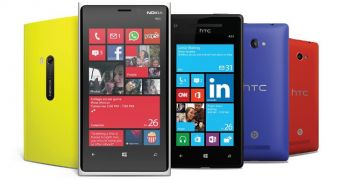Microsoft is finally starting to matter in the smartphone market. Since the company launched Windows Phone 7 back in 2010, it has struggled to become a major player in the market.
Due to circumstances that have nothing to do with Microsoft, Windows Phone is now ranked as the third smartphone operating system when it comes to market share.
The circumstances I’m referring to are related to the sudden fall of BlackBerry, which has recently switched places with Windows Phone and is now ranked as number 4.
Windows Phone has seen slight increases in market share in Europe in the first quarter of the year, but the platform is still far behind Apple’s iOS, which is ranked second in top 3.
It’s hard to believe that Microsoft will manage to reach even 10% of market share worldwide in the next 3 years. For your information, Apple’s iOS now sits at 14.8% market share, while Windows Phone has only 3.5%.
The main problem for Microsoft is that the slight growth for its Windows Phone platform is due to users switching from BlackBerry and much less from Android. Even less iOS users are willing to switch to Windows Phone.
Now that BlackBerry OS has been cannibalized by other platforms, mostly by Windows Phone, there seems to be little room for growth for Microsoft’s mobile operating system.
BlackBerry’s market share has already reached the point where it can’t lose users anymore, which is why Windows Phone now has to grow by getting people to switch from Android and/or iOS.
This seems to happen quite often in Europe, where Windows Phone has a ridiculously high market share in some countries. For example, in France, Windows Phone has been accounted for no less than 10.1% market share, while in Italy it has even more, 11.8%.
Unfortunately, the US smartphone market seems to be too tough for Windows Phone, which not only has a low market share, but it has also dropped by 1% since the beginning of the year.
According to Kantar’s latest survey, Windows Phone has a market share of 4.7% in the United States, down from 5.6% last year.
The reason may be the lack of new Windows Phone handsets, though this doesn’t seem to affect markets in Europe. Perhaps US consumers are looking for new devices more often than those in Europe or maybe they are more attached to Android and iOS platforms.
The same goes for Japan and, surprisingly, China, where Windows Phone barely has 1% market share (actually 0.8% in China). One of the largest smartphone markets in the world, China should be among the most important targets for Windows Phone.
And apparently, it was until recently, as the numbers say that Windows Phone had a 2.2% market share last April and dropped to 0.8% this year. The situation might change given the recent launch of the new Windows Phone 8.1 devices, but on the long run, it’s unclear how Windows Phone will perform in the Mainland.
If Microsoft manages to improve Windows Phone market share in the United States and China, the future of the operating system may be even brighter than it is now.
I believe the Redmond-based company is now preparing for a series of announcements meant to get people even more excited about the new Windows Phone 8.1 platform.
These announcements will certainly include partnerships with major players in the smartphone market that abandoned Windows Phone, but also new devices with different price points.
Backed by a smart marketing campaign and lots of money, Windows Phone could really close the huge gap that separates it from Apple’s iOS.

 14 DAY TRIAL //
14 DAY TRIAL //